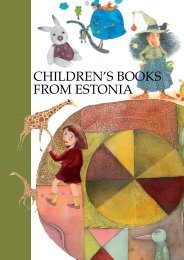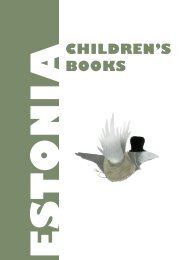No 4 Autumn 2012 - Estonian Literature
No 4 Autumn 2012 - Estonian Literature
No 4 Autumn 2012 - Estonian Literature
Create successful ePaper yourself
Turn your PDF publications into a flip-book with our unique Google optimized e-Paper software.
10 Books from Estonia<br />
Mihkel Mutt<br />
Mihkel Mutt<br />
Cave PeoPle going<br />
on reCord<br />
Subtitled Fate Stories from Gossip Columns, the novel is a remarkable and<br />
monumental treatment of a rather long period, beginning with the decades<br />
after World War II and ending at the present. Amid the novel stands a pub<br />
known as The Cave – a meeting point of Tallinn’s cultural elite. Writers,<br />
artists, and musicians opposed to the oppressing power of Soviet rule come<br />
together in The Cave seemingly every evening of the year, except for some<br />
dull weeks in summer. (The prototype of this place, Tallinn’s famous Kuku<br />
Club, still exists today.) Throughout his works, Mutt’s protagonists have been<br />
cultural figures. The narrator in this novel is a rather modest man, who – first<br />
a translator (from Old Iranian), and later as a columnist at a tabloid – enjoys<br />
accompanying this fellowship. The man is likewise a keen observer.<br />
The turning point of the novel is the change of power. In International<br />
Man (Rahvusvaheline mees, 1994), Mutt described the restoration of <strong>Estonian</strong><br />
independence as an employee at the <strong>Estonian</strong> Foreign Ministry. This time,<br />
the event is reflected from a different point of view: as seen, participated in and<br />
even carried out metaphorically from<br />
The Cave. There are two important<br />
heroes among an entire gallery of cultural<br />
figures in the novel, whose lives since<br />
boyhood are detailed. One of them is a<br />
rebel, the other a collaborator with the<br />
Soviet order. Although one is expelled<br />
from university and the other follows<br />
“the right path”, both ways expose the<br />
pressure of the time. It is also a story of<br />
adjustment, and notes with sarcasm that<br />
those, who fit well in one system are also<br />
suited for another, and vice versa.<br />
What becomes clear from the novel is<br />
that the Soviet period, although a mental<br />
prison, was paradoxically the Golden<br />
Age for writers and artists if they at least<br />
apparently seemed to fit into the system.<br />
These figures had to take censorship into<br />
consideration and write between the lines to conceal their attitudes; however,<br />
they were honoured royally without having to push themselves publically. This<br />
is the tragedy that the protagonist witnesses: he sees his mission in advertising<br />
his friends through photos taken for gossip columns.<br />
Mutt’s sharp pen likewise exposes strange behaviour in a variety of social<br />
contexts: the novel consists partly of letters from a friend living in a village,<br />
who undisguisedly attacks everything foolish in every kind of system.<br />
Text by Elle-Mari Talivee<br />
mihkel muTT (b. 1953) is one of Estonia’s most<br />
interesting authors and is well known for his English<br />
sense of humour. He is the author of several novels,<br />
plays, short stories, critical works, political essays,<br />
travel stories, and recently also memoirs. His<br />
first novel, Hiired tuules (Mice in the Wind, 1982)<br />
addressed theatre circles and became a cult item in<br />
itself. Through his works, Mutt has dedicated much<br />
to the lives of intellectuals, often with humour and<br />
self-irony.<br />
Mutt graduated in <strong>Estonian</strong> philology and journalism<br />
from the University of Tartu. He has worked in<br />
literary magazines and newspapers, in theatre and<br />
the <strong>Estonian</strong> Foreign Ministry, has been a freelance<br />
writer, and since 2007 has held the post of editorin-chief<br />
of the cultural monthly Looming. As a<br />
columnist, Mutt reviews theatre and social issues,<br />
and also holds an interest in public policy.<br />
Publishing deTails<br />
Kooparahvas läheb ajalukku<br />
Fabian, <strong>2012</strong>, pp. 464<br />
Rights’ contact: Ilvi Liive at estlit@estlit.ee<br />
<strong>No</strong> 4 <strong>Autumn</strong> <strong>2012</strong><br />
3







